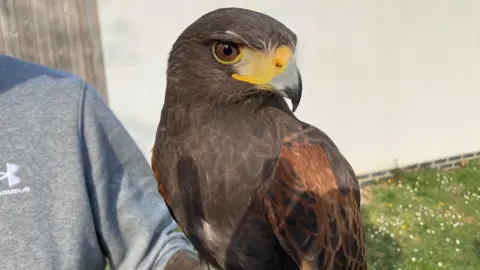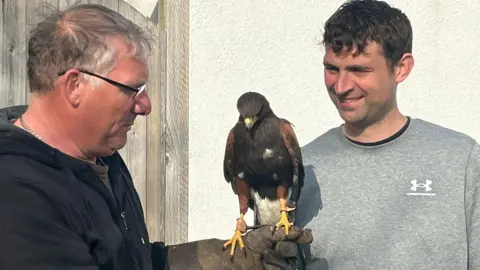Flamstead Hawk update reveals he has 'calmed down'
 Justin Dealey/BBC
Justin Dealey/BBCA hawk that terrorised villagers for a month has "calmed down considerably" and is recovering at his new home since being captured.
The Harris's hawk, named "Bomber", was trapped by a resident in the Hertfordshire village of Flamstead after attacking an estimated 50 people since the start of March, sometimes drawing blood and sending one man to hospital.
An unnamed falconer caring for the hawk provided an update on its condition from Flamstead Parish Council, saying: "There's still a bit of a journey ahead, but we're getting there."
"He's a lovely little character and it's been a joy to watch him come into his own," they added.
"Since being caught, he's calmed down considerably," the update said.
"It's taken a lot of patience and gentle persuasion to move him away from his all-chicken diet, but he's now enjoying a much healthier, natural mix of food.
"That's a big step forward for him."
The hawk was still "slightly jumpy" when his carer has taken him outside on the glove, but he was flying confidently in a 30ft line.
 Jonathan Vernon-Smith/BBC
Jonathan Vernon-Smith/BBCThe update from Flamstead Parish Council referred to the bird as "Bomber".
After he was captured his handler told the BBC he wanted to name him after Bomber Harris, the RAF commander responsible for the bombing of Dresden during World War Two.
Another anonymous falconer told the BBC that they had been working to capture the bird since January and it had been difficult as villagers had been feeding him.
Bomber's unusual violence was blamed on the fact he was hormonal or territorial.
Follow Beds, Herts and Bucks news on BBC Sounds, Facebook, Instagram and X.
